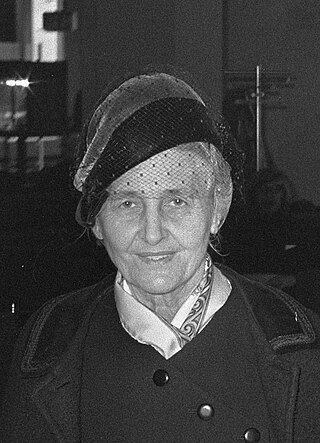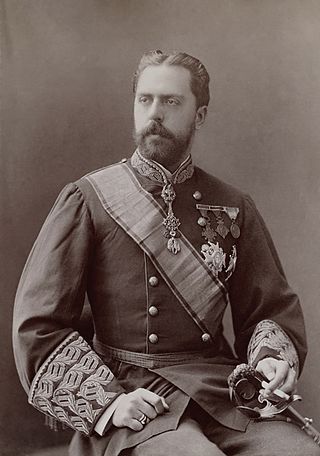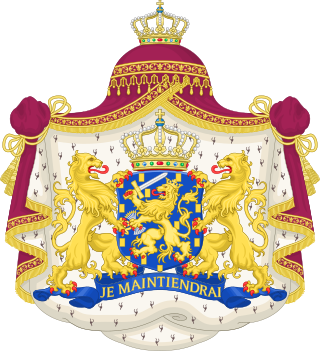
Carlism is a Traditionalist and Legitimist political movement in Spain aimed at establishing an alternative branch of the Bourbon dynasty – one descended from Don Carlos, Count of Molina (1788–1855) – on the Spanish throne.

The Legitimists are royalists who adhere to the rights of dynastic succession to the French crown of the descendants of the eldest branch of the Bourbon dynasty, which was overthrown in the 1830 July Revolution. They reject the claim of the July Monarchy of 1830–1848 which placed Louis Philippe, Duke of Orléans, head of the Orléans cadet branch of the Bourbon dynasty, on the throne until he too was dethroned and driven with his family into exile.

Madeleine de Bourbon-Busset was the titular Duchess of Parma and Piacenza and was also Carlist Queen of Spain as the consort of Prince Xavier of Bourbon-Parma, the Carlist pretender to the Spanish throne.

Carlos Hugo, Duke of Parma and Piacenza was the head of the House of Bourbon-Parma from 1977 until his death. Carlos Hugo was the Carlist pretender to the throne of Spain and sought to change the political direction of the Carlist movement through the Carlist Party, of which he was the official head during the fatal Montejurra incidents. His marriage to Princess Irene of the Netherlands in 1964 caused a constitutional crisis in the Netherlands.

DonCarlos de Borbón y Austria-Este was the Carlist claimant to the throne of Spain from 1868, and the Legitimist claimant to the throne of France after the death of his father in 1887.

Prince Sixtus Henry of Bourbon-Parma, known as Enrique V by supporters, is considered Regent of Spain by some Carlists who accord him the titles Duke of Aranjuez, Infante of Spain, and Standard-bearer of Tradition.

Xavier, Duke of Parma and Piacenza, known in France before 1974 as Prince Xavier de Bourbon-Parme, known in Spain as Francisco Javier de Borbón-Parma y de Braganza or simply as Don Javier, was the head of the ducal House of Bourbon-Parma and Carlist claimant to the throne of Spain.
Carlos de Borbón may refer to:
Don Carlos of Spain or Infante Carlos of Spain may refer to:

Carlos Maria Alfonso Marcelo de Borbón-Dos Sicilias y de Borbón-Parma, Infante of Spain, Duke of Calabria was, at his death, the last male infante of Spain during the reigns of his cousins King Juan Carlos I and King Felipe VI.

The House of Bourbon-Two Sicilies is a cadet branch of the Spanish Bourbons that ruled Southern Italy and Sicily for more than a century in the 18th and 19th centuries. It descends from the Capetian dynasty in legitimate male line through Philippe de Bourbon, Duke of Anjou, a younger grandson of Louis XIV of France (1638–1715) who established the Bourbon dynasty in Spain in 1700 as Philip V (1683–1746). In 1759 King Philip's younger grandson was appanaged with the kingdoms of Naples and Sicily, becoming Ferdinand IV and III (1751–1825), respectively, of those realms. His descendants occupied the joint throne until 1861, claimed it thereafter from exile, and constitute the extant Bourbon-Two Sicilies family.

Archduke Karl Pius of Austria, Prince Royal of Hungary and Bohemia, Prince of Tuscany, known as Carlos Pío de Habsburgo-Lorena y de Borbón in Spanish, was a member of the Tuscan branch of the Imperial House of Habsburg and a Carlist claimant to the throne of Spain under the assumed name of "Carlos VIII". He was the tenth and youngest child of Archduke Leopold Salvator of Austria, Prince of Tuscany and Infanta Blanca of Spain.

Prince Carlos of Bourbon-Parma, Duke of Parma and Piacenza is the current head of the House of Bourbon-Parma, as well a member of the Dutch Royal Family. He is the claimant to the defunct throne of the extinct Duchy of Parma. In addition, he is considered by some a contested pretender to the Carlist claim to the throne of Spain under the name Carlos Javier I. In 2016 Carlos told the Spanish press that, while he "does not abandon" his claim to the throne, it is "not a priority" in his life, and he "will not dispute" [no planteo pleito] the legitimacy of King Felipe VI. Since 15 May 1996 he has been part of the enlarged Dutch royal family with the title – conferred on him by the Queen of the Netherlands – of "Prince de Bourbon de Parme" in the Dutch nobility.

Princess Margherita of Bourbon-Parma was the eldest child and daughter of Charles III, Duke of Parma and Princess Louise Marie Thérèse of France, the eldest daughter of Charles Ferdinand, Duke of Berry and Princess Caroline Ferdinande Louise of the Two Sicilies.

Infanta Blanca of Spain was the eldest child of Carlos, Duke of Madrid, Carlist claimant to the throne of Spain and his wife Princess Margherita of Bourbon-Parma. Blanca was a member of the House of Bourbon and - according to the Carlists - an Infanta of Spain by birth. In 1889 she married Archduke Leopold Salvator of Austria. The couple had ten children. The family left Austria after the end of the Monarchy and finally settled in Barcelona. When the male line of Blanca's family died out at the death of her uncle, Alfonso Carlos, Duke of San Jaime, some of the Carlists recognized her as the legitimate heiress to the Spanish throne.

Princess Marie Thérèse of Bourbon-Parma was a French-Spanish political activist and academic. She was a member of the House of Bourbon-Parma, a cadet branch of the Spanish royal family. She was a socialist activist, earning the nickname Red Princess, and a monarchist who supported the Carlist movement. She is the first royal known to have died of COVID-19.

The Order of Prohibited Legitimacy is a Parmese dynastic order of knighthood originally awarded by the House of Bourbon-Parma to Carlist supporters. The order was founded in 1923 by Jaime de Borbón y de Borbón-Parma, a Carlist claimant to the Spanish throne and a Legitimist claimant to the French throne, for rewarding loyalists of the Carlist movement. In modern times, there are two branches of the Order. One branch's Grand Master is Prince Carlos, Duke of Parma while the other's is his uncle, Prince Sixtus Henry.

Princess Cécile Marie Antoinette Madeleine Jeanne Agnès Françoise of Bourbon-Parma, Countess of Poblet was a French humanitarian and political activist. A Carlist, she supported the claims of her father, Prince Xavier, Duke of Parma and Piacenza, to the headship of the House of Bourbon-Parma and his claim to the Spanish throne. She later supported the claim of her older brother, Prince Carlos Hugo, Duke of Parma and his progressive reforms to Carlist ideology over that of her younger brother Prince Sixtus Henry, Duke of Aranjuez's claims and traditionalist stance. An anti-fascist, she opposed the dictatorship of Francisco Franco and was expelled from Spain multiple times for working to promote democratic reforms. During her exile, she made connections in French intellectual circles and attending the 1973 World Congress of Peace Forces and 1974 Berlin Conference. She was present, along with some of her siblings, at the Montejurra massacre in 1976.

Princess Annemarie of Bourbon-Parma, Duchess of Parma and Piacenza is a Dutch consultant, former journalist, and a member of the House of Bourbon-Parma and the Dutch Royal Family. She is the wife of Prince Carlos, Duke of Parma, the pretender to the defunct throne of the extinct Duchy of Parma and the Carlist claimant to the Spanish throne. As such, Annemarie is considered Queen Annemarie of Spain by Carlists. She is the Countess of Molina in her own right, having been bestowed with the title by her father-in-law, Carlos Hugo, Duke of Parma, in 2010. Per a 1996 royal decree issued by Queen Beatrix of the Netherlands, she is entitled to the style and title Her Royal HighnessPrincess Annemarie de Bourbon de Parme in the Netherlands as a member of the extended royal family.

Prince Hugo de Bourbon de Parme, formerly Hugo Klynstra, is a member of the extended Dutch Royal Family as the illegitimate son of Prince Carlos, Duke of Parma. He was the first great-grandchild of Queen Juliana of the Netherlands. Born out of wedlock, he was denied titles and family rights by his father until the Dutch Council of State ruled in his favor in 2018, granting him the style and title of His Royal Highness Prince Carlos Hugo Roderik Sybren de Bourbon de Parme. Despite the ruling, he is not a member of the Dutch royal house nor a member of the House of Bourbon-Parma and is not in the line of succession to the defunct throne of Parma nor the Carlist line of succession to the throne of Spain.

















